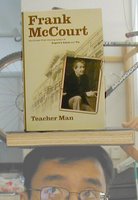yong : book 8/25 : Teacher Man by Frank McCourt
 What do you do next when you're a retired high school English teacher and your first book is Angela's Ashes, a New-York-Times-best-selling, Pulitzer-Prize-winning, literary-world-by-storm-taking phenomenon? Any book that follows is pretty much doomed to fall short. Nay, laddy, yer wrong there. The doom lies not in the failing. 'Tis in this: that knowing that full well, yer doomed to try anyways.
What do you do next when you're a retired high school English teacher and your first book is Angela's Ashes, a New-York-Times-best-selling, Pulitzer-Prize-winning, literary-world-by-storm-taking phenomenon? Any book that follows is pretty much doomed to fall short. Nay, laddy, yer wrong there. The doom lies not in the failing. 'Tis in this: that knowing that full well, yer doomed to try anyways.It's Irish. It's human. It's foolish. And it's courageous.
In a foolish way.
And so our hapless author continued his memoirs in his second book, 'Tis, landing in America, working menial jobs, enlisting in the army, talking his way into teachers' college even though he'd never finished high school--never even entered high school. But I didn't read that book.
Instead, I jumped straight to this his third book, because I'm a teacher in training, and I really wanted to read about the following thirty years of his life as a teacher in the public high schools of New York City. Try to find out more about what I'm getting myself into, what thirty years of the teaching life was like for one person. He spent ten years at two vocational high schools, struggling with discipline, not sure if he was making any difference in these kids' lives, feeling like a moderate failure. He tried a year of teaching at a community college, found that discouraging for different reasons. Couldn't find a job for a while and floundered in substitute teaching limbo. And then somehow found himself at Stuyvesant High, surrounded by bright kids, and thriving.
As a book, it's okay. Some of the personal anecdotes are really touching. But his disconnected narrative style, which worked well in Ashes as a needed buffer from the grueling desperation of Limerick's slums, backfires here by distancing the reader too far from the less visceral, more cerebral crises of mid-life. These emotions need to be amplified, not muted.
But as a reflection on a life of teaching, it's invaluable as a uniquely honest, introspective, self-doubting perspective. I'm not sure if it makes me more or less confident of teaching as a career choice. That someone could be teacher-of-the-year at a magnet school after having spent the first ten years of his career wondering if he had any business even being a teacher, is pretty sobering. That, along with a couple other stories I've recently heard, makes me wonder what power we teachers have at all to help the kids who need it most, versus the ones who would do well regardless.
Mind you, this book isn't just for teachers. For anyone who's ever been a student--and that's every single one of you--McCourt offers the best vicarious glimpse I've yet read of what it's like to be on the other side of that podium or teacher's desk. And it's not at all like you imagine.
And I'm glad to have read it.





